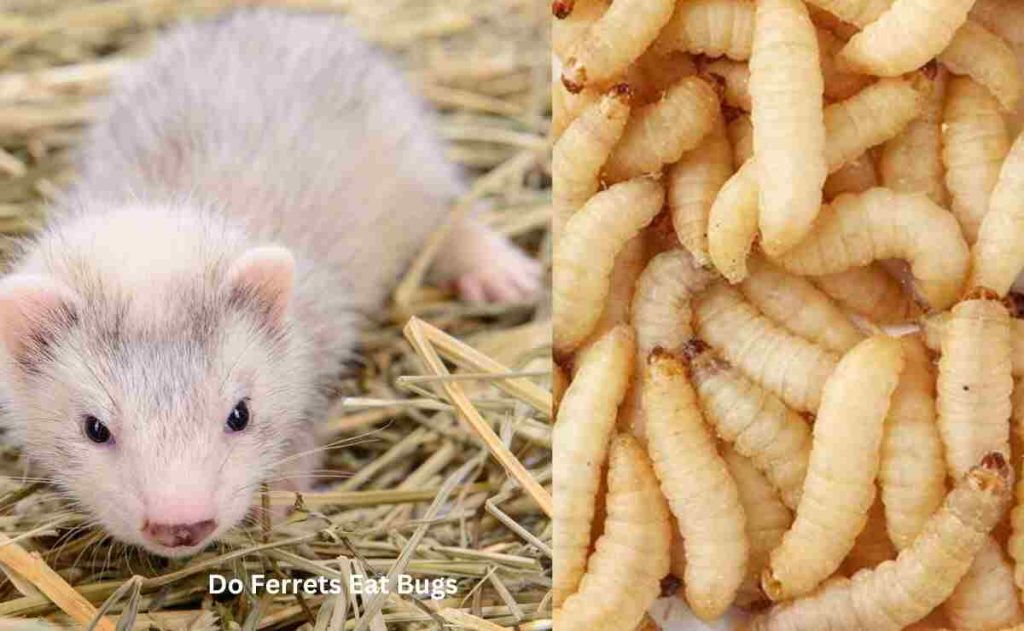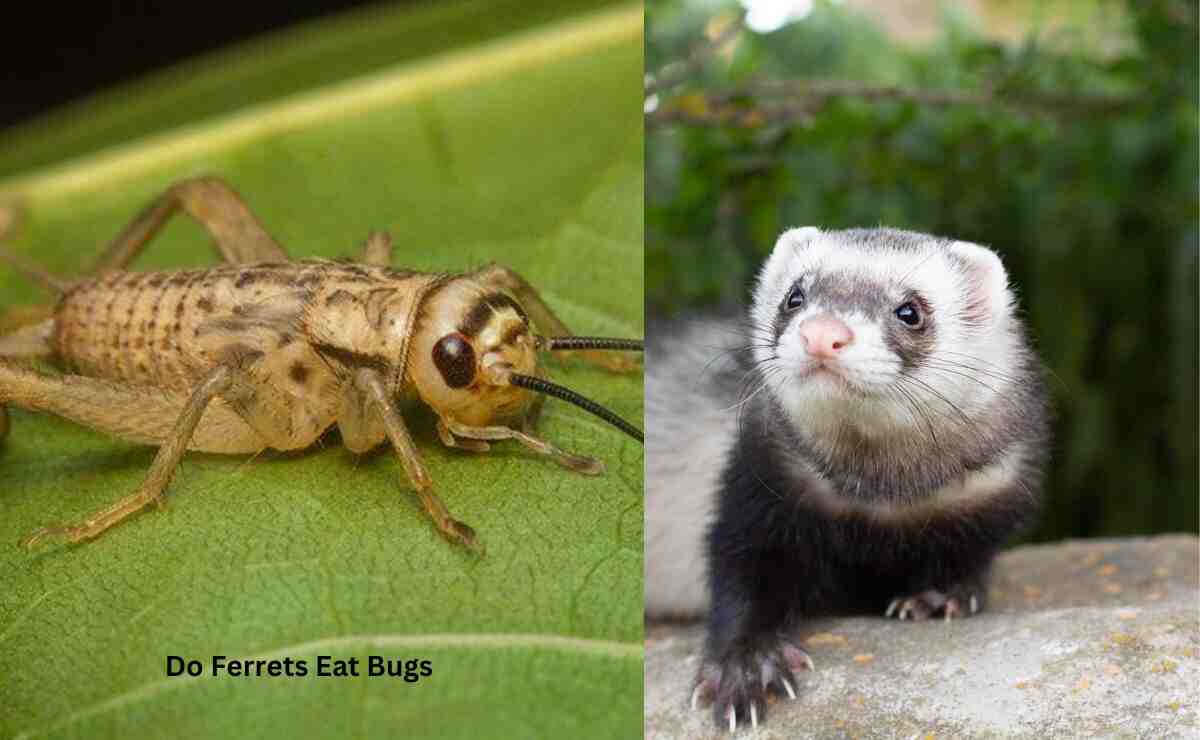If you are an owner of a pet ferret then you must understand what they can and cannot eat. Many people are curious about do ferrets eat bugs? In this article, we will explore the answer to this question, as well as what kinds of bugs a ferret may be able to eat safely.
We’ll also review other important facts about feeding ferrets and the potential health implications of including bugs in their diet.
Do Ferrets Eat Bugs?

Do ferrets eat bugs? It’s a common question asked by potential pet owners, as well as those who are just curious about these curious creatures. Ferrets are small, intelligent animals that can be incredibly entertaining to have around. While they may not look like bug eaters, the answer is yes – ferrets do enjoy eating insects and other small creatures from time to time.
In the wild, ferrets are opportunistic hunters and scavengers that feed on whatever food sources they can find. This means that if a tasty bug happens to wander into their path, they will happily pounce on it and gobble it up! But while ferrets may enjoy eating bugs in their natural environment, most owners do not want them hunting for food indoors.
Are Bugs Safe for Ferrets?
Many studies have shown that ferrets can benefit from a diet that includes bugs. The main advantages are increased protein and nutrients, as well as variety and enrichment to the ferret’s meals. But before your ferret starts snacking on insects, it’s important to know if they are actually safe for them to consume.
The good news is that the majority of insects are safe for ferrets to eat. Options such as mealworms, wax worms, crickets, and grasshoppers are all safe for your pet.
However, some bugs should be avoided at all costs due to their potential toxicity or allergies they may cause in some animals. This includes caterpillars and centipedes which may contain toxins that could make your furry friend sick or even lead to death if consumed in large quantities.
Which Bugs are Good for Ferrets?
While ferrets are carnivorous animals, they can benefit from the occasional consumption of insects.
The most popular insect to give to ferrets is mealworms, as they contain a high amount of protein and nutrients. Mealworms also provide enrichment for your pet that helps keep them from becoming bored. Ferrets also eat super worms which contain high protein.
Additionally, crickets can provide good nutrition for your ferret; though not as much as mealworms, crickets still have beneficial proteins and minerals that make them a great treat.
Insects can provide a range of nutrients like protein, calcium, and fatty acids that are difficult for pet ferrets to obtain through other sources.
Generally speaking, the most appropriate bugs for pet ferrets include mealworms, crickets, wax worms, and earthworms. These insects have high levels of essential vitamins and minerals like copper and zinc that can help keep your pet energetic and well-nourished.
When selecting bugs for your ferret, it’s important to note that the insects should be free of pesticides and other chemicals. To ensure safe consumption by your pet, purchase only feeder-grade insects from a trusted source or grow your own at home with organic materials.
Which Bugs are Poisonous for Ferrets?
Ferrets are beloved pets to many, but it is important for owners to know which bugs may be dangerous. Ferrets can be curious creatures, so they may put themselves at risk of ingesting venomous bugs if left unsupervised. It is essential that ferret owners understand which bugs to keep an eye out for so they can keep their furry friends safe.
There are some common insects that can cause harm to ferrets if ingested or come into contact with the skin. These include spiders (like black widows and brown recluses), fleas, ticks, bees, and wasps – all of which carry harmful toxins or venom in their saliva or stingers. Even though the majority of these bugs are unlikely to cause serious injury, it is important for pet owners to properly educate themselves on the potential risks posed by each insect species and take any necessary precautions.
How to Feed Ferrets Bugs?
One of the most interesting food items for ferrets is bugs. While you may be tempted to simply let your ferret hunt for some bugs outdoors, there are certain precautions you should take when feeding them insects.
There are a few things to keep in mind when feeding your ferret bugs. First, only feed your pet pre-killed insects like crickets or mealworms. Live bugs have the potential to bite or injure your pet if they try to catch them themselves. Second, be sure that all insects you feed your ferret are pesticide-free and organic where possible as these chemicals can be harmful to their health if ingested.
Remember, bugs are not to eat as a daily meal for ferrets. Bugs should be fed only as a treat once in a while. Always keep a sharp eye after you feed your ferrets bugs. If there is any unusual reactions, stop that right then!
Can Ferrets Eat Grasshoppers?
Grasshoppers are a great source of protein and other important nutrients such as calcium, phosphorus, magnesium, sodium, and iron which are essential for a healthy ferret. Additionally, they contain other vitamins like vitamin B12 which help with cell growth and development.
When feeding your pet ferret grasshoppers make sure you remove any legs or wings so that your pet does not choke on them or get caught in their mouth or throat.
Do Ferrets Eat Cockroaches?
Ferrets do not typically eat cockroaches, as most of their diet consists of fresh meat or kibble specifically designed for ferrets. Cockroaches may be too large or hard for them to consume and could potentially cause digestive issues if they were ingested by a ferret.
Additionally, there is also the potential risk of parasites presents in cockroaches which can be harmful to ferrets if consumed. In general, it is advised against feeding your ferret cockroaches as part of their regular diet.
Do Ferrets Eat Ants?
Ferrets are carnivores by nature and have evolved to hunt small mammals like rats, mice, voles, rabbits, and even birds. Occasionally they may also feed on insects like worms and crickets.
Although it is possible that ferrets may catch some ants during their hunts or scavenging activities, it’s unlikely that they would actively seek out ant colonies to consume them as a regular food source. But the truth is- ants are not good for ferrets.
Conclusion
It is important to note that ferrets are natural predators and will often hunt for bugs to snack on. While these insects may make up a part of their diet, they should not be considered a primary source of food.
Feeding your pet ferret a nutritionally balanced dry kibble or wet canned food is essential to its overall health and well-being. If you have any questions about what your ferret should eat, be sure to consult your veterinarian for advice.
